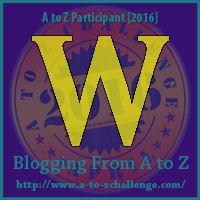

|
My theme for the April A to Z blogging challenge is productivity for creative people.  In Getting Things Done: The Art of Stress-Free Productivity, David Allen advocates using a weekly review to stay on top of your various projects and commitments. He says the weekly review process is “whatever you need to do to get your head empty again. It’s going through the five phases of workflow management--collecting, processing, organizing, and reviewing all your outstanding involvements--until you can honestly say, ‘I absolutely know right now everything I’m not doing but could be doing if I decided to.’”  Isn’t that a freeing concept--tracking all of your to dos, knowing you are not forgetting anything, than consciously choosing your current task? Allen recommends the end-of-day Friday for these reviews, which might make sense for traditional office jobs. Personally, I try to spend some time each Sunday night updating my to do list and reviewing my calendar so I can plan for the week ahead. Do you have any traditions or ways to get ready for each week?
My theme for the April A to Z blogging challenge is productivity for creative people. 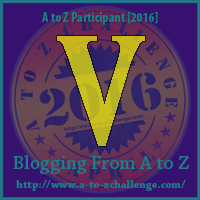 Here's an inspirational quote from author Victor Hugo for today's post. If you are blogging from A to Z, how is it going? Did you pre-write your posts? Are you enjoying visiting other blogs? In the comments, put a link to a new blog you've discovered through A to Z.
My theme for the April A to Z blogging challenge is productivity for creative people.  It sounds counterintuitive, but unplugging from technology can improve your productivity in the long run. Disconnecting has its benefits (Huffington Post): “Research shows that signing off from work email over the weekend allows you to recover from the demands of your job. . . .What's more? Taking a break will make you MORE productive in the long-term, according to emerging research on ‘strategic renewal.’” If you’ve ever taken a break from social media, you probably agree that it can be refreshing. Unplugging can also make you happier. According to Fitness magazine, "A study at the Missouri University of Science and Technology investigated the relationship between Internet usage and moods and found that college students with depressive symptoms all shared similar behaviors when it came to browsing the Web and that excess time spent chatting online only increased feelings of real-world loneliness. Lesson learned: Beat Facebook fatigue by logging off. It's that simple.” Tiffany Shlain, founder of the Webby Awards, takes a “technology Shabbat” every week (Greatist.com): "Without the constant buzzing and pinging, Shlain has time to space out and explore her imagination. 'It puts my mind into a different mode of thinking,” she says. “It’s supple and allows me to be creative and inspired.'" I love the idea of one day a week without technology, but I haven't implemented it yet. Do you unplug on vacations? Have you tried to disconnect on a regular basis?
My theme for the April A to Z blogging challenge is productivity for creative people. 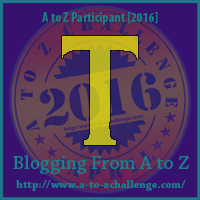 “Filling the well” is a concept from Julia Cameron’s book about creativity, The Artist’s Way. Cameron says, “Any extended period or piece of work draws on our artistic well. Overtapping the well, like overfishing the pond, leaves us with diminished resources. . . As artists, we must learn to be self-nourishing. We must become alert enough to consciously replenish our creative resources as we draw on them—to restock the trout pond, so to speak. . . . In filling the well, think magic. Think delight. Think fun.” Listening to music can fill the well, or cooking (if you find that fun). I like to go to new places, even if it’s a new grocery store, so that mundane chores have a different feeling. Visiting museums or reading outside of your usual genre can fill the well. Even sitting in a coffee shop, observing people, can work. Do you take time to replenish the artistic well?
What are your favorite activities? My theme for the April A to Z blogging challenge is productivity for creative people. 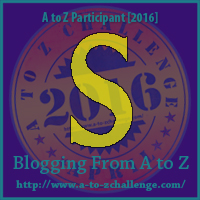 If you are not under an official deadline, one way to encourage progress is to manufacture your own due date. You can make a promise to yourself (“I will finish this draft before the kids are off for summer vacation!”), and if that doesn’t work, make a promise to someone else. Let your niece know that you’ll finish knitting the blanket in time for her birthday. Tell your critique partners that you’ll have chapters ready for them. Set up a blog schedule and notify your followers that you’ll be posting on certain days. If you have an agent, give her a date when you’ll have the manuscript done.  I find that once I’m accountable to other people, I’m much more likely to honor that commitment. According to The Power of Deadlines, “the general pattern is that, as people approach a deadline, they typically become more motivated and work harder at the task in hand, and performance can even improve.” Do you find deadlines motivating or stressful?
Have you ever manufactured a deadline to complete a creative goal? My theme for the April A to Z blogging challenge is productivity for creative people. 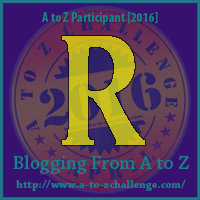 Author Jack Gantos has an impressive writing routine. He writes about 200 days a year in the library. Each day, he spends two hours drafting, two hours revising, two hours reading, and about two more hours working before he heads home. (He spoke about this during his SCBWI Winter Conference speech a few years ago.) I was able to ask Gantos about it recently, and he said, “I try my best to keep to a rigid schedule which still allows for me to be creative within the boundaries.”  Author Jack Gantos Author Jack Gantos The concept of having a routine (or set schedule) means that you don’t need to decide what to work on next, or how long you will work, or whether or not you are feeling inspired. It just means the creative stuff gets done. James Clear compiled the daily routines of twelve other authors. Two excerpts: E.B. White: “A writer who waits for ideal conditions under which to work will die without putting a word on paper.” Barbara Kingsolver (about writing while raising kids): "I used to say that the school bus is my muse. When it pulled out of the driveway and left me without anyone to take care of, that was the moment my writing day began, and it ended when the school bus came back." Do you have a set creative schedule? Do you use environmental cues (like working in a library or waiting for the kids to leave for school) to trigger your creativity?
My theme for the April A to Z blogging challenge is productivity for creative people.  I started this post with Quit Something as the title, with the “something” to be determined. (Last year, my post was Quit Bad Habits.)  Then I realized that Quit Something was actually a great title. Because it doesn’t matter what you specifically eliminate. Find the task that is not useful, that does not bring joy, that is not required, and quit doing it. Maybe you can stop watching a TV show you no longer love or unsubscribe from newsletters that you delete without reading. Or maybe quit multitasking, if nothing else comes to mind. Is there something you can quit (or say no to) in order to regain some time? Even small increments add up.
My theme for the April A to Z blogging challenge is productivity for creative people.  Sometimes I think I procrastinate by reading books about productivity. The irony! If you want to try this method of procrastination, too, here are some books that I recommend: Die Empty: Unleash Your Best Work Everyday by Todd Henry First Things First by Stephen R. Covey Getting Things Done: The Art of Stress-Free Productivity by David Allen Manage Your Day-To-Day: Build Your Routine, Find Your Focus, and Sharpen Your Creative Mind, edited by Jocelyn K. Glei 168 Hours: You Have More Time Than You Think by Laura Vanderkam 7 Secrets of the Prolific: The Definitive Guide to Overcoming Procrastination, Perfectionism, and Writer's Block by Hillary Rettig (Thanks to author Maria E. Andreu for recommending this one.) Do you have any favorite books about productivity, time management, decluttering, or simplifying?
By Yvonne Ventresca My theme for the April A to Z blogging challenge is productivity for creative people.  OneTab is my newest favorite application. I installed it to work with Google Chrome so that when I have a lot of windows open with articles and blog posts I want to save for later, I click on OneTab and it makes a nice list of links for me in a single place. You can then reorder and categorize them. For example, I have “Read Later” and “Blog Ideas” as categories. It’s a convenient way to save temporary links that I don’t want to bookmark until I’ve read them.  OneTab OneTab Do you have any technology tools or applications that make you more productive? My theme for the April A to Z blogging challenge is productivity for creative people.  _Why do so many of us start our day with email instead of a creative project? Daniel Ariely says, “For many things, it’s hard to figure out how much progress you’re making. When you answer a thousand e-mails, you see every e-mail you answer” (“Understanding Our Compulsions,” Managing Your Day-To-Day). So there isn’t necessarily that sense of progress for a bigger project. While it’s satisfying to see your inbox hit zero emails, it’s harder to measure a novel revision. One solution is to brainstorm ways to track progress. For first drafts, writers can do words written, and seeing the wordcount grow satisfies. But what about revisions? What about an artistic project?  One idea is to count the hours spent, if that makes you feel accomplished. Another method is break a larger project into pieces. Novels can be divided into chapters. Break an art project into distinct phases. Or track the number of days you’ve worked on something in a row, creating a chain of success, an idea Jerry Seinfeld implemented to write jokes on a regular basis. The visual chain of Xs serves as a source of encouragement, so you don't break the chain. Do you like Xs on a calendar? Gold stars? Increased word count? Other ideas?
|
JOIN NOW!
Sign up for Yvonne's newsletter for exclusive content, book news, and other occasional author goodies. Archives
June 2025
Categories
All
|